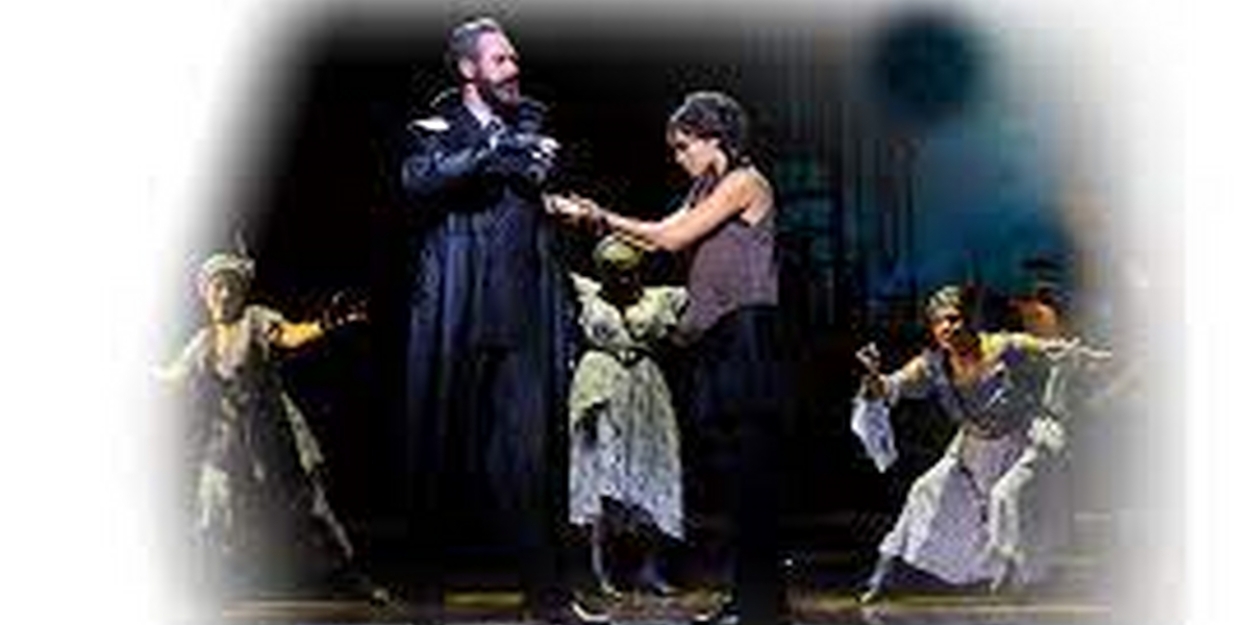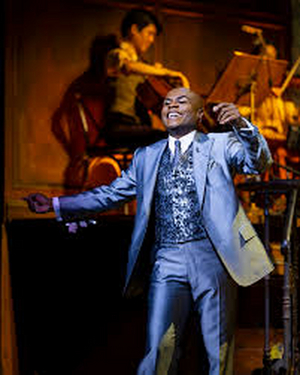Review: The Tony Award-Winning Musical HADESTOWN Stuns At The Bushnell
This stunning production runs through March 12.

 The national tour of the much-lauded Hadestown is playing at the Bushnell in Hartford through March 12, and this production is nothing short of stunning. Though Mortensen Hall is a much larger venue than the Walter Kerr Theatre, where Hadestown is concurrently playing in New York City, and some set pieces have changed, for the most part the touring show succeeds beautifully in giving audiences the same experience that has turned so many, across such a wide age-range, into scarlet-clad repeat attenders.
The national tour of the much-lauded Hadestown is playing at the Bushnell in Hartford through March 12, and this production is nothing short of stunning. Though Mortensen Hall is a much larger venue than the Walter Kerr Theatre, where Hadestown is concurrently playing in New York City, and some set pieces have changed, for the most part the touring show succeeds beautifully in giving audiences the same experience that has turned so many, across such a wide age-range, into scarlet-clad repeat attenders.
With music, lyrics, and book by Anais Mitchell and direction by Rachel Chavkin, Hadestown opened in New York in March of 2019 and went on to win eight Tony Awards, including Best Musical, and the 2020 Grammy Award for Best Musical Theater Album. This is a sung-through piece, in which the story-appropriately, since song is an integral element of the plot-is told almost entirely through musical numbers and amazing choreography (David Neumann). Hadestown braids together not one but two Greek myths of love: that of Orpheus and Eurydice, and that of Hades and his young wife, Persephone. In addition to the incredibly lush romance brought to each of these tales, Hadestown weaves in sharp commentary on climate change, dictatorship, the #Me Too movement, and the plight of impoverished and marginalized people.
The world of the living is presented as a seedy but friendly bar, with music of all kinds: jazz, R&B, folk, ballads, and occasionally pulsating rock. The underworld-Hadestown-is a horrifying mine where mechanized workers move in an endless circle at the bidding of their demonic King Hades, who pockets their earnings and controls their deadened souls. We are told at the top of the show that "The Road to Hell" is a railroad. Rachel Hauck's set design evokes this horror: the bar's back wall transforms into the gaping maw of a train tunnel, which devours those destined for Hell and locks permanently behind them. Michael Krass's costumes also perfectly reflect the ragged clothes of winter, the gorgeous world that Persephone brings in spring, and the barely covered workers down below, whose suffering bodies are, to King Hades, merely machines.
The production's major misstep-and this is the way Hadestown was conceived, rather than a fault of the touring version-is the lighting design by Bradley King, working in collaboration with writer Mitchell and director Rachel Chavkin. Squares containing smaller squares of bright lights are stacked up the sides of the proscenium and across the top, and the action is frequently punctuated by blinding strobe effects that occasionally shine directly into the audience, suddenly making us feel we're at a rock concert rather than witnessing a timeless love story that needs none of this extra intensity. Those who are light sensitive are warned.
However, the casting of this production all but makes up for this design flaw. On opening night, the role of Orpheus, usually played by Chibueze Ihuma, was played by his understudy, J. Antonio Rodriguez. Rodriguez's voice, which for this role must work in a high, sweet, register without sounding like a false falsetto, is perfect, and he beautifully portrayed the musical genius who can "put the world back in tune" with a song but who suffers from nearly agonizing shyness and self-doubt. Rodriguez got us firmly on his side, making his journey through adoration for his Eurydice and then, literally, to hell and back, poignant and nuanced.
As Eurydice, Belén Moyano, the understudy for Hannah Whitley, also went onstage opening night, and watching her initial scrappy bravado melt, first when she hears Orpheus' music, and then into love for the man, was magical. Moyano's voice is lovely without calling attention to itself, which fits Eurydice perfectly, as she depends upon Orpheus to finish his song and thus save them both from the "Gathering Storm," with its inevitable cold, hunger, and darkness. Where Orpheus doubts himself, Eurydice doubts that she could ever have "a soft place to land," and this leaves her heart-breakingly vulnerable.
Hades, played by the astonishing Matthew Patrick Quinn, sees this vulnerability and pounces, like the predator he is. Quinn brings many facets to a role that easily could be a one-note villain. He is a remarkable physical presence: incredibly slender, over 6 feet tall, his voice a deep, rich bass, and his black and silver hair and beard both attractive and terrifying. He has shed all but the tiniest touch of the Southern accent used by the original Hades, Patrick Page, and the role is much the better for this choice: more unique, less easy to stereotype, and harder to predict-though when he invites a starving Euridice to "come into my office," we have no doubt about what will transpire.
Lindsey Hailes' Persephone is also a wonderfully complex character: tipsy with joy at spring's beginning (and her escape from her cold husband); pleading as she begs Hades to remember their early love for the sake of Orpheus and Eurydice; delicate in her unexpected pas de duex with her husband; and fierce as she tells him how the sun is burning up the sky. Hailes' dancing is beyond belief: a reason enough to see Hadestown.
Speaking of dance, as Hermes, our narrator, Nathan Lee Graham moves like water: he is the most graceful being I may have ever seen onstage. Graham's Hermes combines the flash of an old-fashioned MC with, at other times, the sober voice and countenance of a sage. His final words to us, about why we tell this tale over and over again, are the best definition of catharsis I've ever heard, and he delivers them with an uncanny combination of sorrow and comfort.
The entire ensemble must be congratulated for their outstanding performances, and special kudos to the Bushnell, for bringing such a beautiful production to those who can't, for whatever reason, travel to the Great White Way. Hadestown is not to be missed.
Reader Reviews

Videos

